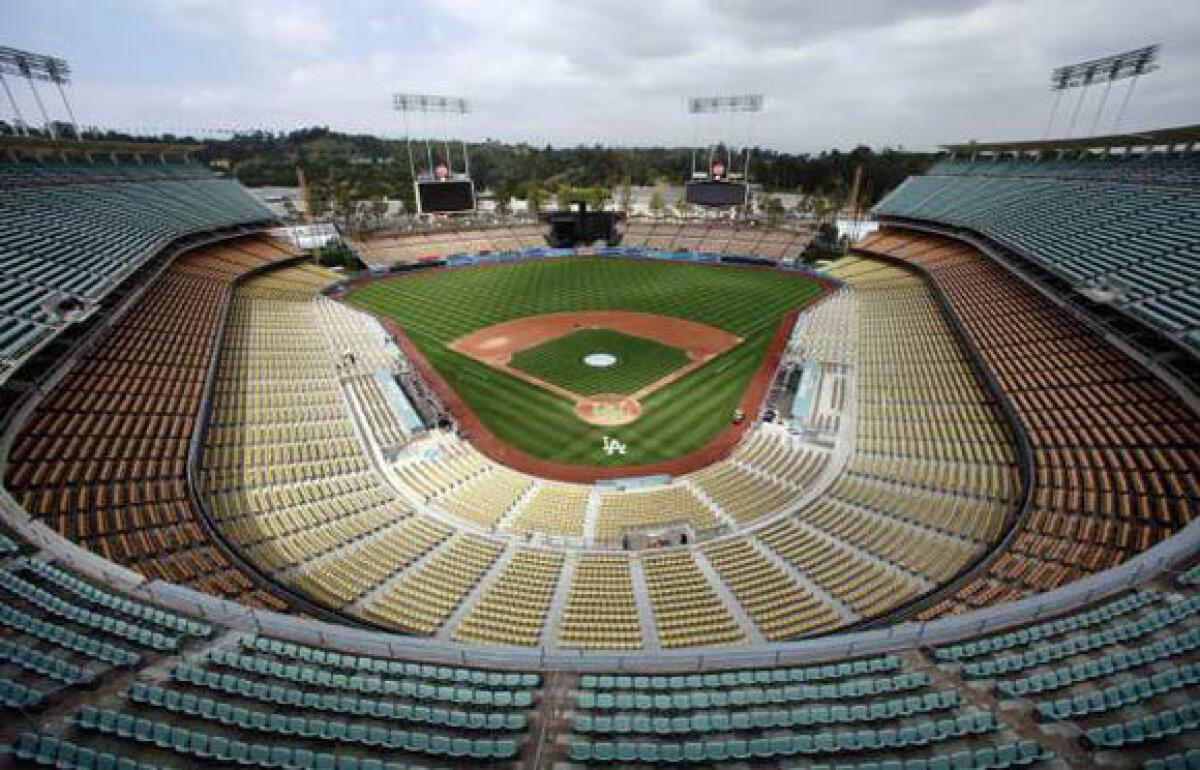Dodgers Dugout: Will baseball start up again in May?

- Share via
Howdy, I’m your host, Houston Mitchell. Remember to stay six feet away from this newsletter while reading. You have no idea where these pixels have been.
News leaked earlier this week that MLB was considering opening the season in May and playing all the games at spring training sites in Arizona or Chase Field, the home of the Arizona Diamondbacks.
Are you a true-blue fan?
Get our Dodgers Dugout newsletter for insights, news and much more.
You may occasionally receive promotional content from the Los Angeles Times.
The plan would involve the sequestering of players, coaching staffs and other essential personnel at local hotels, with travel only to and from stadiums. There are 11 ballparks within 50 miles in the Phoenix area. Most are spring training facilities.
The plan was initially reported by ESPN on Monday. On Tuesday, MLB released a statement: “MLB has been actively considering numerous contingency plans that would allow play to commence once the public health situation has improved to the point that it is safe to do so. While we have discussed the idea of staging games at one location as one potential option, we have not settled on that option or developed a detailed plan. While we continue to interact regularly with governmental and public health officials, we have not sought or received approval of any plan from federal, state and local officials, or the Players Assn.
“The health and safety of our employees, players, fans and the public at large are paramount, and we are not ready at this time to endorse any particular format for staging games in light of the rapidly changing public health situation caused by the coronavirus.”
According to our own Bill Shaikin: “The concept is simple: Test players and other personnel for the virus. If they test negative, they are admitted to the so-called bubble, where they would play, eat and sleep for months in an endless loop from hotel to ballpark and back again.
Fan-free MLB games in Arizona could start as soon as May, according to an ESPN report, but two National League executives told The Times that timetable was overly optimistic. One of the executives doubted the season could start as soon as June; the other was skeptical that the Arizona plan would be feasible at all.”
OK, back to your humble host here. I have no inside information on this, but I don’t see how this possibly happens next month. To me, playing games in front of no fans all in one city is the last-ditch scenario. We aren’t there yet. As usual, finances will dictate what happens, I’m sure. But it seems way too soon for this to happen in May.
Your first Dodgers memory
Well, I asked you to share your first Dodgers memory and you did. I received thousands of responses, so thank you. Since we have plenty of free time on our hands, I’ll continue running multiple “first Dodgers memories.” If you haven’t already, I’d still love for you to send me your first Dodgers memory, and it may run in an upcoming Dodgers Dugout. Include your name. And don’t send only a sentence, tell why that memory sticks out in your mind. You can email me your memory at [email protected]. Thanks.
Bill Finkelstein: My earliest Dodger memory is at age 6 or 7 riding the subway to Ebbets Field with my father, a fanatical Bums fan who grew up in Flatbush as part of “The Greatest Generation.” As we walked up the ramp under the stands to our seats, our timing was amazingly lucky as it turned out that we were close to the ramp from the clubhouse to the dugout and from 25 feet away I saw the heroes of my youth: Campy, Jackie, Gil, Pee Wee and, of course, the Duke, on their way to the field. I will never forget my first time walking through the portal and seeing the expanse of green grass before me with the Schaefer scoreboard attempting to shield Bedford Avenue from would-be home runs. This indelible memory was all the sweeter for it having been shared with my dad.
Rev. James Fladland: My first Dodger memory is the final playoff game between the Dodgers and Giants at the end of the regular season in 1962. Nine-year-old me watched the home team (I grew up in Gardena) blow the game and the pennant, but that loss cemented a bond between me and the Dodgers that has endured nearly sixty years. I found that I loved these guys, even and maybe especially in defeat, and I have taken that affection with me, wherever I have lived in this vast republic.
Peter Geoghegan: I was about 10-years-old living in Old Greenwich, Conn., and turned on the TV. There playing was a team called the Brooklyn Dodgers. I had become very interested in baseball the year before and had began to be very loyal to the Dodgers after leaving San Francisco and my beloved San Francisco Seals. As I continue to watch the game I was feeling terrible that my Dodgers were losing, then in the last at bat the Dodgers started a rally and had the tying and winning runs on base with two out and had brought up a pinch-hitter with the crowd at Ebbets Field going absolutely wild.
Needlessly to say I was terribly excited and was walking back and forth in the television room trying to calm my 10-year-old nerves.
At bat for the Dodgers was George Shuba, with the fans and I at home were yelling our hearts out.
Shuba struck out and the game was over.
I did something I never thought I would do -- I picked up the phone and asked the operator to get me Ebbets field which incredulously she did. The person answering the phone at Ebbets asked me how she could help , where would I like my call directed. I said dugout please. Just then I came to my senses and realized this was not the proper way to behave. It was then I started to understand the heartbreak and happiness this team would give me. They have never disappointed me 70 years later. Go Dodgers!
Book Recommendation
If you are looking for a way to pass the time, I highly recommend a new baseball book that hit the market last week called “The Wax Pack.” The author of the book, Brad Balukjian, had a brilliant idea: Open up a pack of baseball card from the 1980s, then try to track down all the players in the pack and see what they are up to know. What happened was an adventurous road trip that took him all over the country, trying to track down superstars such as Carlton Fisk and Vince Coleman, to more nondescript players such as Jaime Cocanower and Randy Ready. And there’s a former Dodger in there too: Steve Yeager. Balukjian’s favorite? “Don Carman, hands down,” he told me earlier this week. “They say to never meet your hero because of inevitable disappointment, but as in everything else, Carman is an outlier.”
Ask Ross Porter
Former Dodgers broadcaster Ross Porter has agreed to return for another season of “Ask Ross Porter.” We have a new email address this season for it. Ross will have access to this email address and will get your questions without me having to forward them. So, if you have a message (like thanking him for his years as a broadcaster) and not a question, feel free to let him know. Send your question or comment to [email protected]. Welcome back, Ross.
Sam Norris asks: Do the major league players get their full salaries this season?
Ross: Players will make anywhere from $275 to $4,775 a day. That means $8,250 a month for the lower paid while those with large single contracts will receive $143,250 per month while in a shutdown mode. Teams will collectively pay $173 million from March 26 to May 24.
Jerry Williams of Edmond, Okla. asks: Ross, we go back together a long ways. I remember as a young child loving the energetic style you had of delivering sports on Channel 4 in Oklahoma City. As a left-handed pitcher growing up, Sandy Koufax was my idol, and I became a life-long Dodger fan. I had the pleasure of meeting Sandy a few years ago and he was a complete gentleman to me! Can you share a few of your favorite Koufax stories?’
Ross: I’m very pleased to hear from you, Jerry. My wife, Lin, and I lived in Edmond the first five years we were married, and then came to California in 1966. Unfortunately, I never saw Sandy pitch in person as his last game was less three weeks before our arrival in Los Angeles. Several years after he retired at 30, Koufax joined me as the analyst on our Saturday afternoon “High School Basketball Game of the Week” telecasts on KNBC. Many people don’t know Sandy was a good basketball player, averaging 16 points an outing at Lafayette High in Brooklyn. That earned him a basketball scholarship at the University of Cincinnati. He spent a year there, also pitching before the Dodgers signed him for $6,000 with a $14,000 bonus. Sandy and I one day announced a FIVE overtime game which saw Beverly Hills nip Aviation, 92-91. Rick Caesar, the 6’8” son of comedian Sid Caesar, scored 40 points for Beverly Hills. The biggest problem we had came after games when we tried to get from the gymnasium to our car as fans blocked the way, trying to get Sandy’s autograph. He always obliged, but we kept walking.
Arnetta Jones asks: Hi, Ross: Other than the players, who are the people in the dugout?
Ross: Rule 5.10 (k) of the Major League Rulebook states: No one except players, substitutes, managers, coaches, trainers and bat boys shall occupy a bench during a game. Players on the injured list are permitted to sit on the bench during a game, but may not take part in any activity such as bench-jockeying.
Andrew Lieber asks: What does a bench coach do?
Ross: A bench coach is considered the manager’s right-hand man and assists in decision-making. He typically is in charge of the team when the manager is ejected from the game.
Andrew Hernandez of Glendale asks: Ross, what were the longest and quickest games you announced?
Ross: Andrew, I hold the major league record for a solo broadcast, working six hours and 14 minutes by myself on radio in 1989 at Montreal in a game won by the Dodgers, 1-0 in 22 innings. The shortest was at Houston in 1992. It was the final game of plate umpire Doug Harvey‘s 31-year career. Before they started, when the lineup cards were exchanged, Doug told the two men representing their teams, “This is my last game and I want it over quickly. Tell your batters they had better be swinging because I’m not calling many balls.” Sure enough, there were only two walks that day and 21 strikeouts. The Astros won, 3-0, and it took one hour and 44 minutes.
And finally
Highlights of the 1955 World Series. Watch them here.
Until next time...
Have a comment or something you’d like to see in a future Dodgers newsletter? Email me at [email protected], and follow me on Twitter at @latimeshouston. To get this newsletter in your inbox, click here.
Go beyond the scoreboard
Get the latest on L.A.'s teams in the daily Sports Report newsletter.
You may occasionally receive promotional content from the Los Angeles Times.




